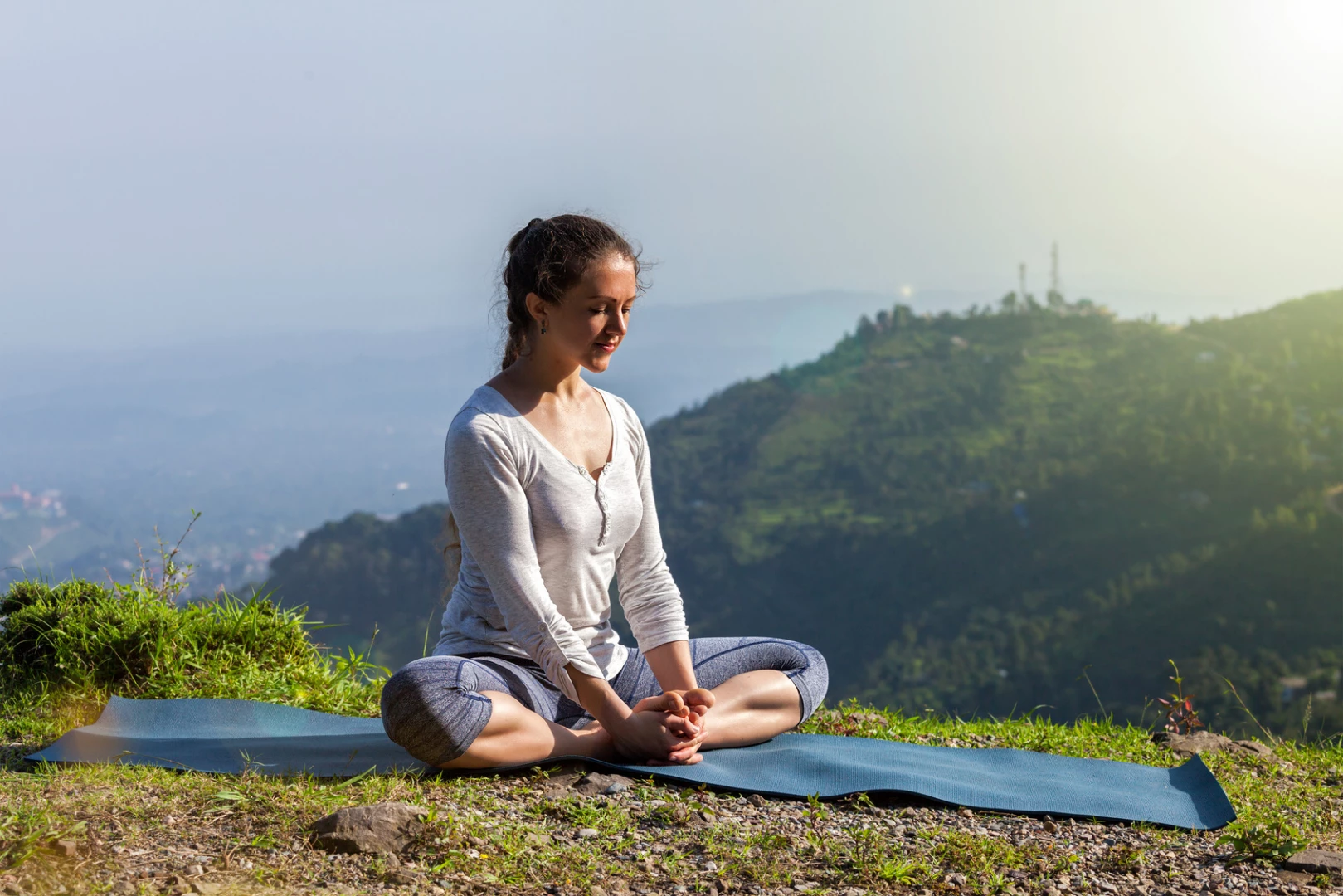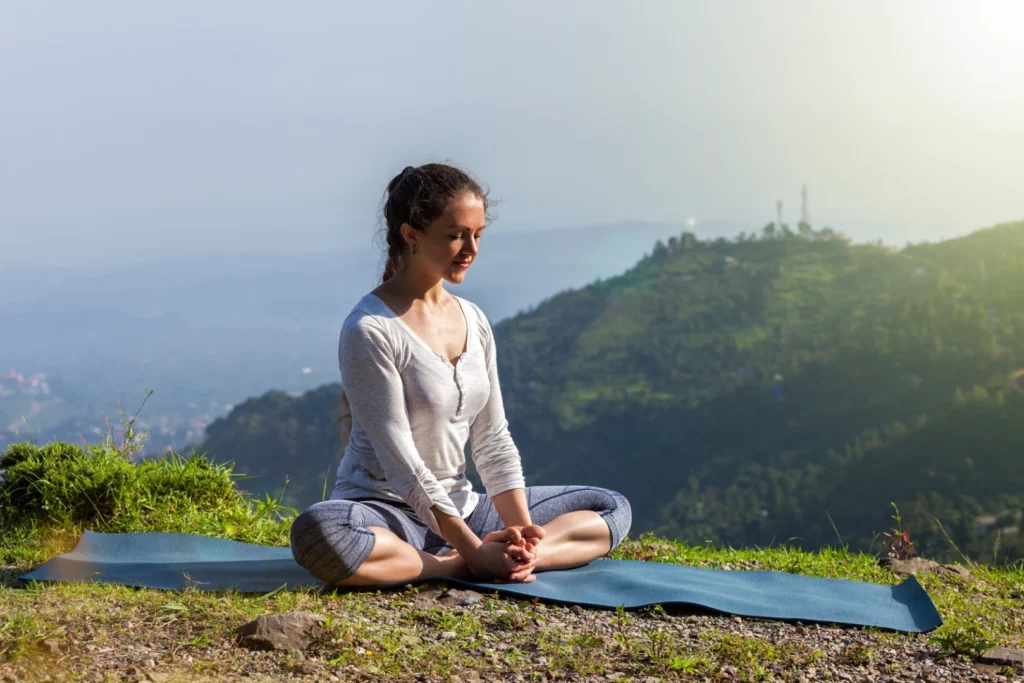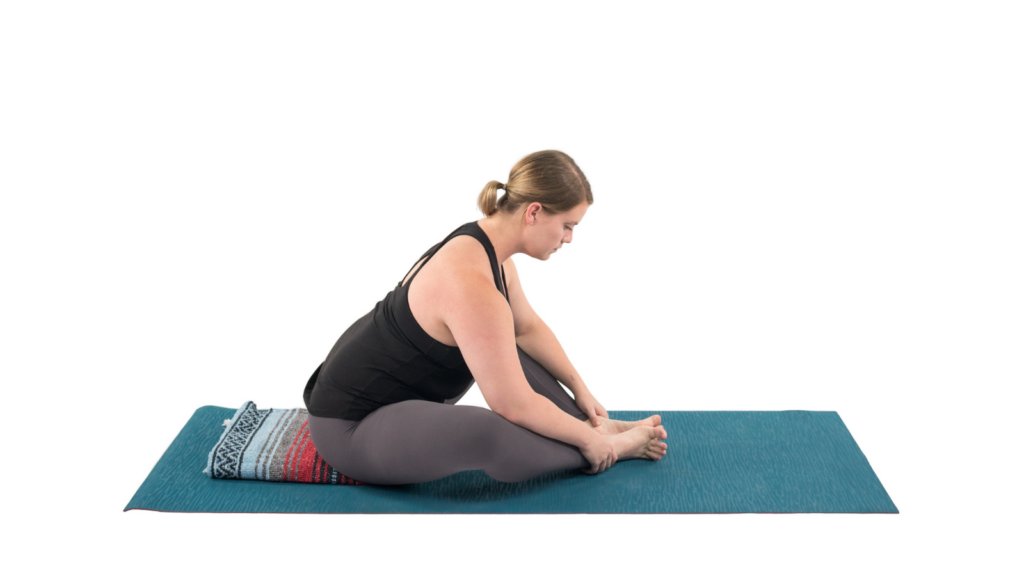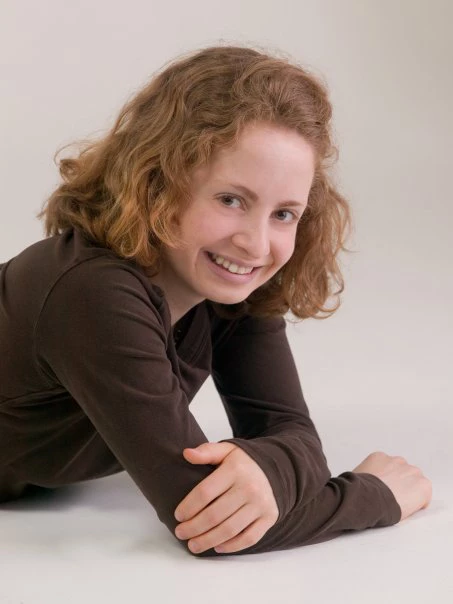Welcome Warmer Weather! An Outdoor Yoga Sequence

When is the best time to practice outdoor yoga? Spring—when flowers are blooming, birds are singing, and there is a feeling of new energy all around. We feel that energy in our bodies. We might notice a new bounce in our steps and feel a natural smile on our faces.
As the world outside thaws, so do our bodies. Muscles that clenched and huddled inward to guard against the cold of winter begin to release and open. How might we assist our bodies with this thawing and opening and celebrate this new energy of spring? You guessed it—yoga! Let’s take a look at a yoga sequence to do just that.
The following practice works well outside, but it can also be practiced inside if necessary. If you’re practicing in a public outdoor space, such as a park, most people will pay no mind and let you flow to your heart’s content.
If you can find a patch of grass that’s clean and soft, practicing without a mat works just fine. You can certainly use a mat, but be mindful of a couple of things: One, it can make your mat notably dirty; and two, your mat can feel like uneven, unsteady ground unless the earth beneath it is flat and even.
Outdoor Yoga: Warm up With Sun Salutations

- Practice three rounds of Surya Namaskar A (Sun Salutation A) to ensure that your body is fully warmed up. Notice the warm sun, and the life all around you—trees, flowers, grass, birds, other animals—for which the sun allows. Feel the life within you.
- Add in any other variations. Try different versions of Phalakasana (Plank Pose) (Plank Pose with knees down shown right), Virabhadrasana I, II, and III (Warrior Poses), gentle backbends, side bends, and twists that will allow you to celebrate that life within and all around more fully.
- Just be mindful that it’s early in your practice and your body might not be thoroughly warmed up yet; listen to your body as it guides you, so you’re tuned into poses that you are and aren’t ready to do.
Warrior Strength Flow In Nature
Virabhadrasana II (Warrior II Pose)
- From Tadasana (Mountain Pose), step your right foot back two or three feet to set up for Virabhadrasana II.
- Angle your back foot slightly inward, grounding down through the outer edge.
- Reach your arms outward from your shoulders.
- Find your expansive strength by lifting upward from the bottom ribs as you breathe in, and bending a bit more deeply into your front knee as you breathe out.
- Hold for 5 to 10 breaths.
Trikonasana (Triangle Pose)

- From Virabhadrasana II, straighten your front knee and tiptoe the back foot a few inches forward toward your front foot to set up Trikonasana.
- Reach your front arm and ribcage forward and then extend outward, bending laterally toward your front leg. Bring your hand down to the shin or a yoga block.
- Reach your top arm up toward the ceiling, aligning your top shoulder over your bottom one. Use the back of your front hand on the inside of your front shin to assist with that adjustment.
- Hold for 5 to 10 breaths, taking in the fresh, warm spring air all around.
Virabhadrasana I (Warrior I Pose)

- From Virabhadrasana II, raise your torso back up to vertical and square your chest forward. Bend your front knee, and raise your arms so they are parallel and next to your ears. (cactus arms variation shown right)
- Ground down through the outside edge of your back foot to give you strength and stability.
- Hold for 5 to 10 breaths and notice the support the warming earth gives you as the sun also shines on your skin.
- Step your back foot forward, next to your front foot, returning to Tadasana. From there, practice these three poses on the other side of your body, stepping your left foot back first.
Balancing in the Breeze In An Outdoor Yoga Practice
Vrksasana (Tree Pose)

- From Tadasana, set up Tree Pose on the right side. Shift your weight onto your left foot. Bend your right knee and place your right foot on your inner thigh, calf, or ankle.
- Place your hands together in Anjali Mudra (Prayer Position) in front of your heart, or you can reach them up so that your arms make a “v” shape around your head.
- Root your standing leg, and at the same time, reach to the sky through the top of your head, like the strong, steady trees all around you.
- Hold the pose in that feeling for 5 to 10 breaths.
Natarajasana (Dancer Pose)

- Release your right foot from your left inner thigh, and with the knee still bent, point your right knee down, lining it up with your left knee so that you can grab the instep of the right foot with your right hand.
- Raise your left arm to the sky. This might be your excellent Dancer Pose for today.
- So long as your right knee doesn’t wing out further to the side, you can feel free to press your foot into your right hand here for a fuller expression of the pose.
- Hold for 5 to 10 breaths, imagining that you are dancing through the trees and the breeze.
Dekasana (Airplane Pose)

- Release the grip of your foot with your hand, and let that leg fly back while your torso lowers until it’s parallel to the ground.
- Extend your arms out to your sides, like a bird’s wings (or reaching back as shown right). Keep the back of your neck long.
- Feel a lift behind your heart as you grow longer from your flying heel (toes dialed down and inner thigh spiraling up on the same side) to your head.
- Practice the pose for 5 to 10 breaths, feeling stable, strong, and full of ease, like the birds flying around nearby.
- Practice this and the previous two poses on the other side of the body, starting with the left knee bent into the Tree Pose. Breathe in life all around you, and savor the life in you.
Poses to Close Your Outdoor Yoga Class

Baddha Konasana (Bound Angle Pose)
- Sit on the ground in whatever position is most comfortable for you.
- Then, place the bottoms of your feet together while your knees fall out to the side.
- Sit up tall, growing roots down through your seat but feeling the crown of your head grows up toward the clouds.
- Let your knees gently bounce up and down like the wings of a butterfly. You might even see an actual butterfly flying by!
- Continue this for 5 to 10 breaths.
Parvrtta Baddha Konasana (Revolved Bound Angle Pose)
- Take the back of your left hand to your outer right thigh and your other hand behind you, far enough away that your collarbones stay wide but not so far that you lean backward.
- For 5 to 10 breaths, breathe in to grow taller through your spine, and breathe out to twist just a bit more,
- Return to the center, and then practice the twist on the left side.
Baddha Konasana Forward Fold

- Lift your heart gently up, then fold forward slowly and carefully—leading with your pelvis, not your waist—either holding onto your ankles or reaching your arms forward and letting your fingers rest on the floor on blocks.
- Breathe into this stretch for 5 to 10 breaths, finding length as you breathe in, and softening around that length as you breathe out.
- Let the calm, mild energy of spring resonate through your body.
Final Rest and Closing

- Lie your torso back in the grass or on your mat. Keep your legs in the Baddha Konasana shape, or lengthen them out onto the ground.
- Breathe in the freshness of the air and notice the energy of your practice pulsing through you. Offer up gratitude for that energy.
- When you are ready, come to a comfortable seat.
- Finish your practice with three deep, clear breaths in and out—hands at your heart or resting on your thighs.
 Kathryn Boland is an RCYT and R-DMT (Registered Dance/Movement Therapist). She is originally from Rhode Island, attended George Washington University (Washington, DC) for an undergraduate degree in Dance (where she first encountered yoga), and Lesley University for an MA in Clinical Mental Health Counseling, Expressive Therapies: Dance/Movement Therapy. She has taught yoga to diverse populations in various locations. As a dancer, she has always loved to keep moving and flowing while practicing more active Vinyasa-style forms. Her interests have recently evolved to include Yin and therapeutic yoga, and aligning those forms with Laban Movement Analysis to serve the needs of various groups (such as Alzheimer’s Disease patients, children diagnosed with ADHD, and PTSD-afflicted veterans – all of which are demographically expanding). She believes in finding the opportunity within every adversity, and doing all that she can to help others live with a bit more breath and flow!
Kathryn Boland is an RCYT and R-DMT (Registered Dance/Movement Therapist). She is originally from Rhode Island, attended George Washington University (Washington, DC) for an undergraduate degree in Dance (where she first encountered yoga), and Lesley University for an MA in Clinical Mental Health Counseling, Expressive Therapies: Dance/Movement Therapy. She has taught yoga to diverse populations in various locations. As a dancer, she has always loved to keep moving and flowing while practicing more active Vinyasa-style forms. Her interests have recently evolved to include Yin and therapeutic yoga, and aligning those forms with Laban Movement Analysis to serve the needs of various groups (such as Alzheimer’s Disease patients, children diagnosed with ADHD, and PTSD-afflicted veterans – all of which are demographically expanding). She believes in finding the opportunity within every adversity, and doing all that she can to help others live with a bit more breath and flow!




